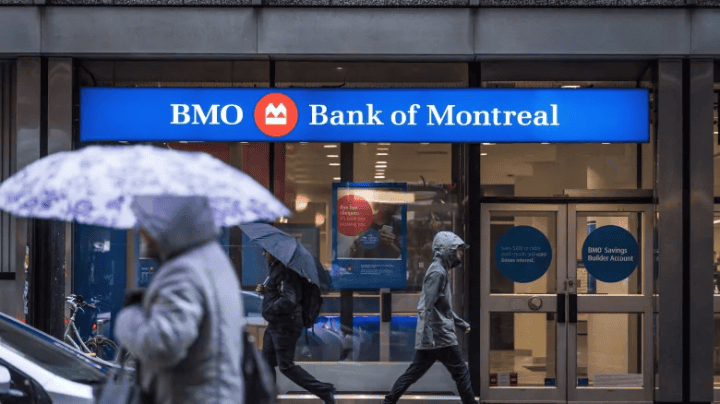
Results fail to meet analyst expectations despite profit surge
The Bank of Montreal hiked its dividend as its second-quarter profit climbed 20 per cent compared with a year ago fuelled by its footprint south of the border, but fell short of market estimates due to severance costs.
The bank increased its quarterly payment to shareholders by three cents to $1.03 per share.
BMO said Wednesday its profit amounted to $1.5 billion or $2.26 per diluted share for the quarter ended April 30, compared with $1.25 billion or $1.86 per diluted share a year ago.
On an adjusted basis, BMO reported diluted cash earnings per share of $2.30 for the quarter, up from $2.20 during the same period a year earlier.
Total provisions for credit losses, or money set aside for bad loans, amounted to $176 million, up from $160 million a year prior.
Analysts on average had expected a profit of $2.33, according to Thomson Reuters Eikon.
“BMO’s continued strong performance this quarter is highlighted by good momentum across our U.S. platform and in our North American commercial banking business, reflecting our differentiated approach to growing customer relationships,” chief executive Darryl White said in a statement.
In the latest quarter, Canada’s fourth-largest lender benefited strength in the U.S. and growth at home and in wealth management, but BMO Capital markets saw a drop in net income as it faced a large severance charge.
Its U.S. personal and commercial banking division reported net income of $406 million, marking a $58 million or 17 per cent increase compared with the prior year. The bank said the results were largely due to good revenue growth and lower provisions for credit losses, partially offset by higher expenses.
The bank’s domestic personal and commercial banking arm posted net income of $615 million, up $27 million or roughly five per cent from the same period a year earlier. The division’s results reflected good revenue growth, which was partially offset by higher expenses and higher provisions for credit losses.
BMO Wealth Management reported second quarter net income of $305 million, up $9 million or three per cent from the year prior.
BMO Capital Markets posted quarterly net income of $249 million, down nearly 13 per cent from $286 million in the prior year. The bank said its strong performance in investment and corporate banking and higher trading products revenue were largely offset by severance expenses and higher provisions for credit losses.
The bank’s common equity tier one ratio, a key measure of a lender’s financial health, stood at 11.3 per cent as of April 30. This is down from 11.4 per cent in the previous quarter but flat from one year ago.
BMO’s underlying fundamentals at its Canadian and U.S. personal and commercial banking divisions remained “solid” this quarter, with growth on both sides of the border, said Scott Chan, an analyst with Canaccord Genuity Corp.
The bank’s capital markets segment faced a severance charge $90-million post tax, that if excluded, would have resulted in BMO’s earnings per share exceeding Canaccord’s estimate, he added. The severance charge had a negative impact of roughly 14 cents per share.
“Outside of the severance charge, capital markets would have produced a strong showing, while wealth management rebounded from last quarter,” he said in a note to clients.


